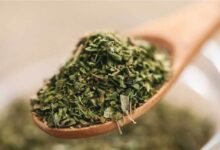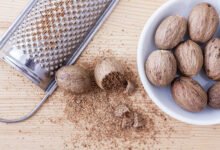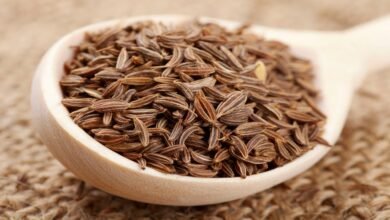10 Health Benefits of Cardamom, Backed by Science

Cardamom is a spice with an intense, slightly sweet flavor that some people compare to mint.
It originated in India but is available worldwide today and used in both sweet and savory recipes.
The seeds, oils and extracts of cardamom are thought to have impressive medicinal properties and have been used in traditional medicine for centuries (1, 2).
Here are 10 health benefits of cardamom, backed by science.

Cardamom may be helpful for people with high blood pressure.
In one study, researchers gave three grams of cardamom powder a day to 20 adults who were newly diagnosed with high blood pressure. After 12 weeks, blood pressure levels had significantly decreased to the normal range (3Trusted Source).
The promising results of this study may be related to the high levels of antioxidants in cardamom. In fact, the participants’ antioxidant status had increased by 90% by the end of the study. Antioxidants have been linked to lower blood pressure (3Trusted Source, 4Trusted Source).
Researchers also suspect that the spice may lower blood pressure due to its diuretic effect, meaning it can promote urination to remove water that builds up in your body, for example around your heart.
Cardamom extract has been shown to increase urination and decrease blood pressure in rats (5Trusted Source).
SUMMARYCardamom may help lower blood pressure, most likely due to its antioxidant and diuretic properties.
The compounds in cardamom may help fight cancer cells.
Studies in mice have shown that cardamom powder can increase the activity of certain enzymes that help fight cancer (6Trusted Source, 7Trusted Source).
The spice may also enhance the ability of natural killer cells to attack tumors (8Trusted Source).
In one study, researchers exposed two groups of mice to a compound that causes skin cancer and fed one group 500 mg of ground cardamom per kg (227 mg per pound) of weight per day (7Trusted Source).
After 12 weeks, only 29% of the group who ate the cardamom developed cancer, compared to over 90% of the control group (7Trusted Source).
Research on human cancer cells and cardamom indicate similar results. One study showed that a certain compound in the spice stopped oral cancer cells in test tubes from multiplying (9Trusted Source).
Even though the results are promising, these studies have only been conducted on mice or in test tubes. Human research is needed before stronger claims can be made.
SUMMARYCertain compounds in cardamom may fight cancer and stop the growth of tumors in mice and test tubes. Human research is needed to validate if these results apply to humans as well.
Cardamom is rich in compounds that may fight inflammation.
Inflammation occurs when your body is exposed to foreign substances. Acute inflammation is necessary and beneficial, but long-term inflammation can lead to chronic diseases (10Trusted Source, 11Trusted Source, 12).
Antioxidants, found in abundance in cardamom, protect cells from damage and stop inflammation from occurring (13Trusted Source).
One study found that cardamom extract in doses of 50–100 mg per kg (23–46 mg per pound) of body weight was effective in inhibiting at least four different inflammatory compounds in rats (14Trusted Source).
Another study in rats showed that eating cardamom powder decreased liver inflammation induced by eating a diet high in carbs and fat (15Trusted Source).
Though there are not as many studies on the anti-inflammatory effects of cardamom in humans, research shows that supplements may increase antioxidant status by up to 90% (3Trusted Source).
SUMMARYThe antioxidant compounds in cardamom may help protect cells from damage and slow down and prevent inflammation in your body.
Cardamom has been used for thousands of years to help with digestion.
It’s often mixed with other medicinal spices to relieve discomfort, nausea and vomiting (1).
The most researched property of cardamom, as it pertains to relieving stomach issues, is its possible ability to heal ulcers.
In one study, rats were fed extracts of cardamom, turmeric and sembung leaf in hot water before being exposed to high doses of aspirin to induce stomach ulcers. These rats developed fewer ulcers compared to rats that only received aspirin (16Trusted Source).
A similar study in rats found that cardamom extract alone could completely prevent or reduce the size of gastric ulcers by at least 50%.
In fact, at doses of 12.5 mg per kg (5.7 mg per pound) of body weight, cardamom extract was more effective than a common anti-ulcer medication (17Trusted Source).
Test-tube research also suggests that cardamom may protect against Helicobacter pylori, a bacteria linked to the development of most stomach ulcer issues (18Trusted Source).
More research is needed to know if the spice would have the same effect against ulcers in humans.
SUMMARYCardamom may protect against digestive issues and has been shown to reduce the number and size of stomach ulcers in rats.
The use of cardamom to treat bad breath and improve oral health is an ancient remedy.
In some cultures, it’s common to freshen your breath by eating entire cardamom pods after a meal (1).
Even the chewing gum manufacturer Wrigley uses the spice in one of its products.
The reason why cardamom can lead to minty fresh breath may have to do with its ability to fight common mouth bacteria (19Trusted Source).
One study found that cardamom extracts were effective in fighting five bacteria that can cause dental cavities. In some test-tube cases, the extracts prevented the growth of the bacteria by up to 0.82 inches (2.08 cm) (20).
Additional research shows that cardamom extract can reduce the number of bacteria in saliva samples by 54% (21).
However, all of these studies have been conducted in test tubes, making it unclear how the results may apply to humans.
SUMMARYCardamom is often used to treat bad breath and is a component of some chewing gums. This is because cardamom might be able to kill common mouth bacteria and prevent cavities.
Cardamom also has antibacterial effects outside of the mouth and may treat infections.
Research shows that cardamom extracts and essential oils have compounds that fight several common strains of bacteria (22Trusted Source, 23Trusted Source, 24Trusted Source, 25Trusted Source).
One test-tube study examined the impact of these extracts on drug-resistant strains of Candida, a yeastthat can cause fungal infections. The extracts were able to inhibit the growth of some strains by 0.39–0.59 inches (0.99–1.49 cm) (26Trusted Source).
Additional test-tube research found that essential oils and extracts of cardamom were just as, and sometimes more effective than standard drugs against E. coli and Staphylococcus, bacteria that can cause food poisoning (23Trusted Source).
Test-tube studies have also shown that cardamom essential oils fight the bacteria Salmonella that leads to food poisoning and Campylobacter that contributes to stomach inflammation (24Trusted Source, 25Trusted Source).
Existing studies on the antibacterial effects of cardamom have only looked at isolated strains of bacteria in labs. Therefore, the evidence is currently not strong enough to make claims that the spice would have the same effect in humans.
Compounds in cardamom may help increase airflow to your lungs and improve breathing.
When used in aromatherapy, cardamom can provide an invigorating odor that enhances your body’s ability to use oxygen during exercise (27).
One study asked a group of participants to inhale cardamom essential oil for one minute before walking on a treadmill for 15-minute intervals. This group had a significantly higher oxygen uptake compared to the control group (27).
Another way that cardamom may improve breathing and oxygen use is by relaxing your airway. This may be particularly helpful for treating asthma.
A study in rats and rabbits found that injections of cardamom extract could relax the throat air passage. If the extract has a similar effect in people with asthma, it may prevent their inflamed airways from restricting and improve their breathing (28).
SUMMARYCardamom may improve breathing by stimulating better oxygen uptake and relaxing air passage to the lungs in humans and animals.
When taken in powder form, cardamom may lower blood sugar.
One study found that feeding rats a high-fat, high-carb (HFHC) diet caused their blood sugar levels to remain elevated longer than if they were fed a normal diet (15Trusted Source).
When rats on the HFHC diet were given cardamom powder, their blood sugar did not stay elevated for longer than the blood sugar of rats on a normal diet (15Trusted Source).
However, the powder may not have the same effect in humans with type 2 diabetes.
In a study in over 200 adults with this condition, participants were divided into groups that took only black tea or black tea with three grams of either cinnamon, cardamom or ginger every day for eight weeks (29Trusted Source).
The results showed that cinnamon, but not cardamom or ginger, improved blood sugar control (29Trusted Source).
In order to better understand the effect of cardamom on blood sugar in humans, more studies are needed.
SUMMARYA study on rats suggests that cardamom may help decrease high blood sugar levels, but more high-quality human studies are needed.
In addition to the aforementioned health benefits, cardamom may be good for your health in other ways as well.
Studies in rats have found that the high antioxidant levels in the spice may prevent both liver enlargement, anxiety and even aid weight loss:
- Liver protection: Cardamom extract may decrease elevated liver enzymes, triglyceride and cholesterol levels. They may also prevent liver enlargement and liver weight, which reduces the risk of fatty liver disease (30, 31Trusted Source, 32Trusted Source, 33Trusted Source).
- Anxiety: One rat study suggests that cardamom extract may prevent anxious behaviors. This may be because low blood levels of antioxidants have been linked to the development of anxiety and other mood disorders (34Trusted Source, 35Trusted Source, 36Trusted Source).
- Weight loss: A study in 80 overweight and obese prediabetic women found a link between cardamom and slightly reduced waist circumference. However, rat studies on weight loss and the spice have not found significant results (15Trusted Source, 37Trusted Source)
The number of studies on the link between cardamom and these potential benefits is limited and mostly done on animals.
Furthermore, the reasons why the spice may help improve liver health, anxiety and weight are unclear.
SUMMARY: A limited number of studies suggests that cardamom supplements may decrease waist circumference and prevent anxious behaviors and fatty liver. The reasons behind these effects are unclear but may have to do with the spice’s high antioxidant content.
Cardamom is generally safe for most people.
The most common way to use cardamom is in cooking or baking. It’s very versatile and often added to Indian curries and stews, as well as gingerbread cookies, bread and other baked goods.
The use of cardamom supplements, extracts and essential oils is likely to become more common in light of the promising results of research on its medicinal uses.
However, there is currently no recommended dose for the spice since most studies have been on animals. The use of supplements should be monitored by a health professional.
Furthermore, cardamom supplements may not be suitable for children and women who are pregnant or breastfeeding.
Most supplements recommend 500 mg of cardamom powder or extract once or twice a day.
The FDA does not regulate supplements, so be sure to choose brands that have been tested by a third party if you’re encouraged to try cardamom supplements by a healthcare provider.
If you’re interested in trying cardamom, remember that adding the spice to your foods may be the safest way.
SUMMARYUsing cardamom in cooking is safe for most people. Cardamom supplements and extracts have not been thoroughly researched and should only be taken under the guidance of a healthcare provider.




